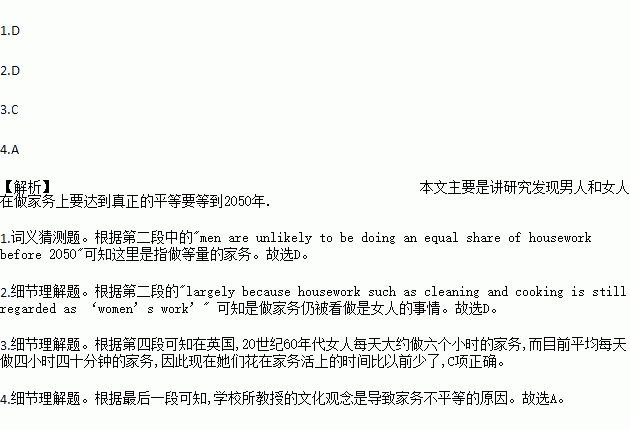题目内容
Housework is a frequent source of disputes (争论) between lazy husbands and their hard-working wives, but women have been warned not to expect men to pull their weight any time soon.
A study from Oxford University has found that men are unlikely to be doing an equal share of housework before 2050. Mothers, the researchers warned, will continue to shoulder the burden of childcare and housework for the next four decades, largely because housework such as cleaning and cooking is still regarded as “women’s work”.
The gap between the amount of time men and women spend on housework has narrowed slowly over the past 40 years. But it will take another four decades before true housework equality (平等) is achieved, the study concluded.
The research found that in the Nordic countries, the burden of housework is shared more equally between men and women. In the UK, women spend an average of four hours and forty minutes each day on housework, compared with two hours and twenty-eight minutes for men. This is an improvement from the 1960s, when British women typically spent six hours a day on housework, while men spent just 90 minutes every day.
But progress towards housework equality appears to be slowing in some countries. Dr Oriel Sullivan, a research reader from Oxford’s Department of Sociology, said, “we’ve looked at what is affecting the equality in the home, and we have found that certain tasks seem to be given according to whether they are viewed as ‘men’s work’ or ‘women’s work’.”
Dr Sullivan said cultural attitudes taught at school may be responsible for the views of housework. “At school it is much easier for a girl to be a tomboy, but it is much more difficult for a boy to enjoy baking and dancing,” she said.
1.The underlined part “pull their weight” in Paragraph 1 probably refers to “ __________ ”.
A. lose weight B. be lazy
C. earn money D. do equal housework
2.Women will continue to do more housework before 2050 mainly because _________ .
A. men are too busy to help
B. they would like to do so
C. they can do better in housework
D. housework will still be considered as women’s work
3.From Paragraph 4 we know that in the UK ___________ .
A. men now spend just 90 minutes a day on housework on average
B. women now are too busy with their work to do housework
C. women now spend less time on housework than before
D. housework is shared equally between men and women
4.In Dr Sullivan’s opinion, what is to blame for the housework inequality?
A. Cultural attitudes towards housework.
B. Policies made by the government.
C. The time spent on work.
D. The type of housework.

